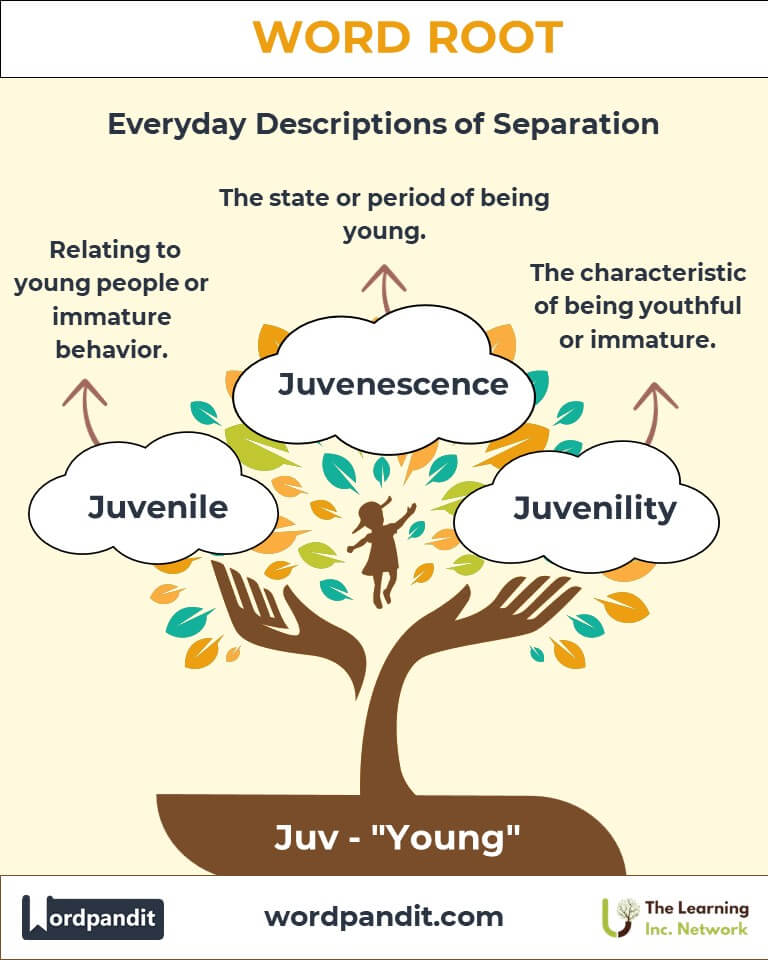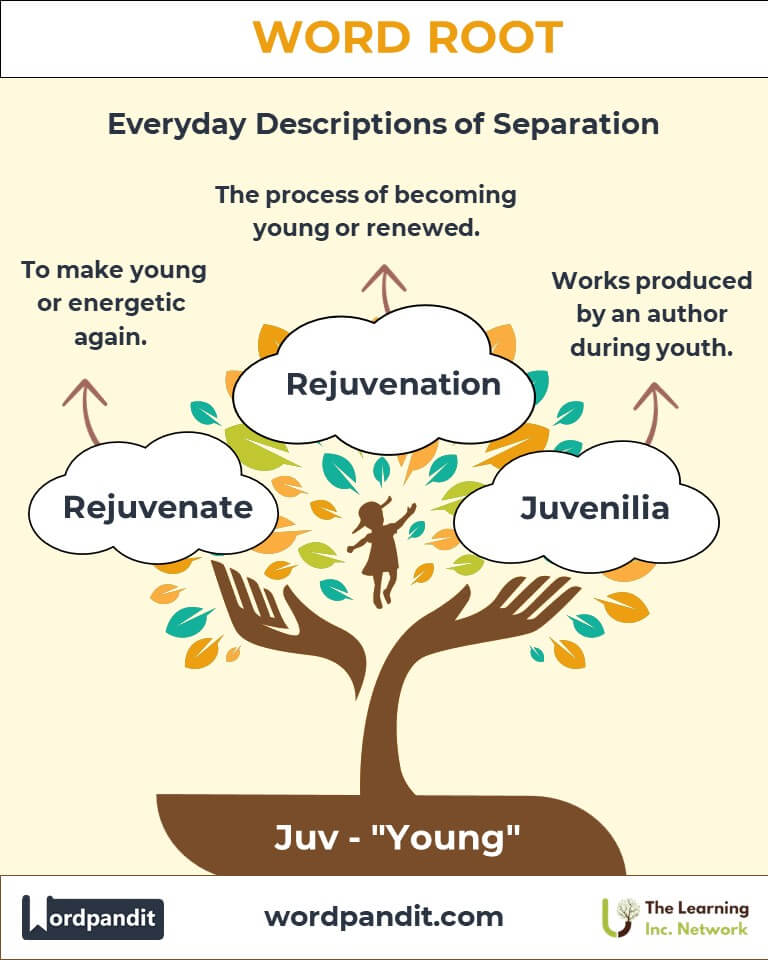Juv: The Root of Youthful Vibrancy
Explore the dynamic and rejuvenating world of the root "juv," derived from the Latin word juvenis, meaning "young." Found in words like juvenile and rejuvenate, this root captures the essence of youth, vitality, and renewal across various domains of language and life.

Table of Contents
- Introduction: The Spirit of Juv
- Etymology and Historical Journey
- Mnemonic: Remembering Juv
- Common Juv-Related Terms
- Juv Through Time
- Juv in Specialized Fields
- Illustrative Story: Juv in Action
- Cultural Significance of Juv
- The Juv Family Tree
- FAQs about the Juv Word Root
- Test Your Knowledge: Juv Mastery Quiz
- Conclusion: The Enduring Legacy of Juv
1. Introduction: The Spirit of Juv
What makes life vibrant and full of possibility? The root "juv", pronounced juhv, symbolizes youth and the energy that comes with it. From childhood adventures to the promise of renewal, this root weaves through language to evoke vitality and freshness.

2. Etymology and Historical Journey
The word root "juv" originates from the Latin juvenis, meaning "young." Its journey into English brought with it a connotation of youthfulness and vigor, influencing words that describe the qualities and phases of youthful energy. Over time, this root has evolved to represent both literal youth and figurative rejuvenation.
3. Mnemonic: Remembering Juv
Picture a glowing fountain labeled "juv", surrounded by young saplings and cheerful children playing. The fountain represents the rejuvenating power of youth and vitality.
Mnemonic Device:
“Juv is the fountain of youth, sparking renewal and joy.”
4. Common Juv-Related Terms
- Juvenile (joo-vuh-nyle):
- Definition: Relating to young people or immature behavior.
- Example: "The park installed special equipment for juvenile visitors."
- Rejuvenate (ree-joo-vuh-nayt):
- Definition: To make young or energetic again.
- Example: "A good night’s sleep can rejuvenate both body and mind."
- Juvenescence (joo-vuh-nes-uhns):
- Definition: The state or period of being young.
- Example: "The artist’s work captures the juvenescence of springtime."
- Juvenility (joo-vuh-nil-uh-tee):
- Definition: The characteristic of being youthful or immature.
- Example: "Despite his age, his juvenility was evident in his playful demeanor."
- Rejuvenation (ree-joo-vuh-nay-shun):
- Definition: The process of becoming young or renewed.
- Example: "The spa specializes in skin rejuvenation treatments."
5. Juv Through Time
- Juvenile: Historically, this term primarily referred to young animals or people. Over time, it gained a broader meaning, including immature or childlike behavior.
- Rejuvenate: Derived from re- (again) and juvenis (young), it evolved during the Renaissance to describe the restoration of youth or vitality.
6. Juv in Specialized Fields
- Biology:
- Juvenile phase: The early stage of an organism’s development.
- Example: "The juvenile stage of the butterfly is the caterpillar."
- Psychology:
- Juvenile behavior: Traits often associated with adolescence, such as impulsivity.
- Application: Understanding juvenility helps address developmental challenges.
- Medicine:
- Juvenile arthritis: A condition affecting young individuals.
- Relevance: Early diagnosis can lead to better outcomes.
- Literature:
- Juvenilia: Works produced by an author during youth.
- Example: "The poet’s juvenilia reveal an early passion for nature."
7. Illustrative Story: Juv in Action
Lila, a stressed city dweller, decided to rejuvenate her spirit by visiting her childhood home. Walking through the familiar forest, she stumbled upon a group of children playing, their laughter echoing through the trees. Inspired by their youthful energy, she joined them in skipping stones, feeling the years melt away. That evening, Lila realized that the spirit of "juv" wasn’t just about age—it was about embracing joy and renewal.
8. Cultural Significance of Juv
The concept of youth, represented by "juv," permeates cultures worldwide. From the mythical Fountain of Youth to modern wellness movements, the pursuit of rejuvenation is universal. The term also reflects society’s evolving understanding of adolescence and the unique challenges and opportunities of youth.

9. The Juv Family Tree
- Adolesc- (Latin: "growing up"):
- Adolescent: A person in the process of growing into maturity.
- Example: "The adolescent years are full of change."
- Vita- (Latin: "life"):
- Vitality: The state of being strong and active.
- Example: "Her vitality was contagious."
- Neo- (Greek: "new"):
- Neophyte: A beginner, often youthful in enthusiasm.
- Example: "The neophyte gardener eagerly planted her first seeds."

10. FAQs About the Juv Word Root
Q: What does "juv" mean, and what is its origin?
A: "Juv" means "young" or "youthful" and is derived from the Latin word juvenis. This root captures qualities and stages of youth, such as vigor, energy, and renewal, influencing various words across disciplines.
Q: What is juvenilia, and why is it significant?
A: Juvenilia refers to creative works, such as literature, art, or music, produced during an individual’s youth. These works often showcase the early development of an artist's or writer’s talent, providing insight into their creative journey.
Q: Does "juvenile" always have a negative connotation?
A: No. "Juvenile" can neutrally refer to young individuals or organisms in an early developmental stage. However, it sometimes carries a negative connotation when used to describe immature or irresponsible behavior.
Q: What does "rejuvenate" mean, and how is it applied?
A: To rejuvenate means to restore youth, vitality, or energy. It is often used metaphorically to describe processes like self-care (e.g., a spa rejuvenating someone’s mood) or scientific advancements (e.g., technologies rejuvenating ecosystems).
Q: What is the juvenile stage in biology, and why is it important?
A: In biology, the juvenile stage refers to the early developmental phase before maturity in an organism’s life cycle. This stage is crucial for studying growth patterns, survival strategies, and the transition to adulthood.
Q: What is juvenile arthritis?
A: Juvenile arthritis is a medical condition that affects young individuals, causing joint inflammation and pain. Early diagnosis and treatment are critical to managing symptoms and improving quality of life.
11. Test Your Knowledge: Juv Word Root Quiz
1. What does "juv" mean?
2. What is juvenilia?
3. What does rejuvenate mean?
4. Which field uses "juvenile" to describe an early stage?
5. What does juvenility describe?
12. Conclusion: The Enduring Legacy of Juv
The root "juv" embodies youthfulness, vitality, and renewal, making it a cornerstone of language and culture. Whether describing childhood, personal rejuvenation, or the juvenile phases of life, it reminds us of the ever-present promise of growth and vitality. Embrace the spirit of "juv" in your own life, and let it inspire you to stay curious and vibrant.












